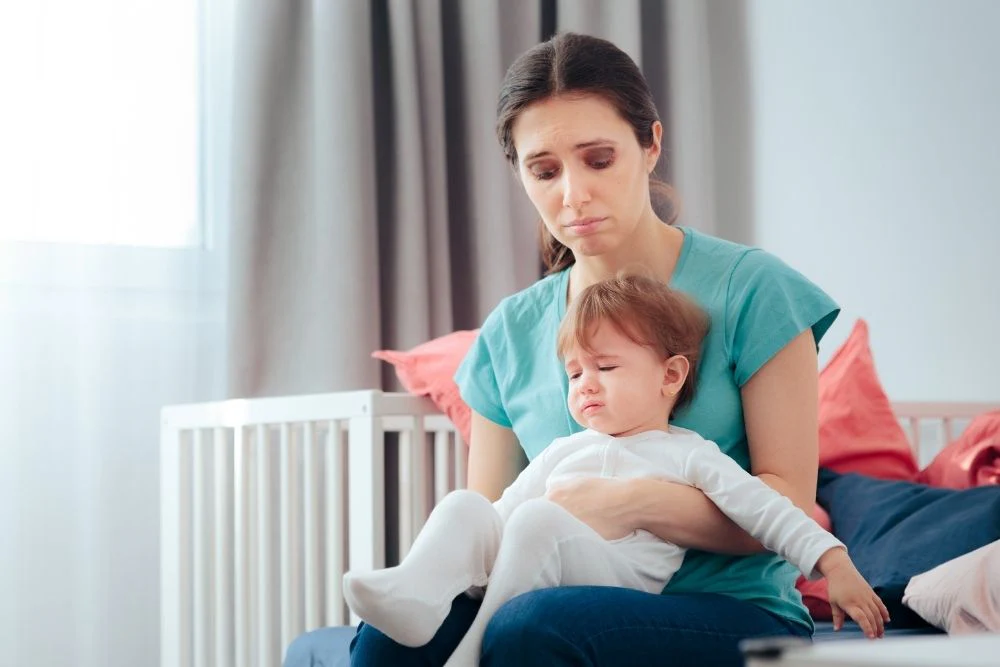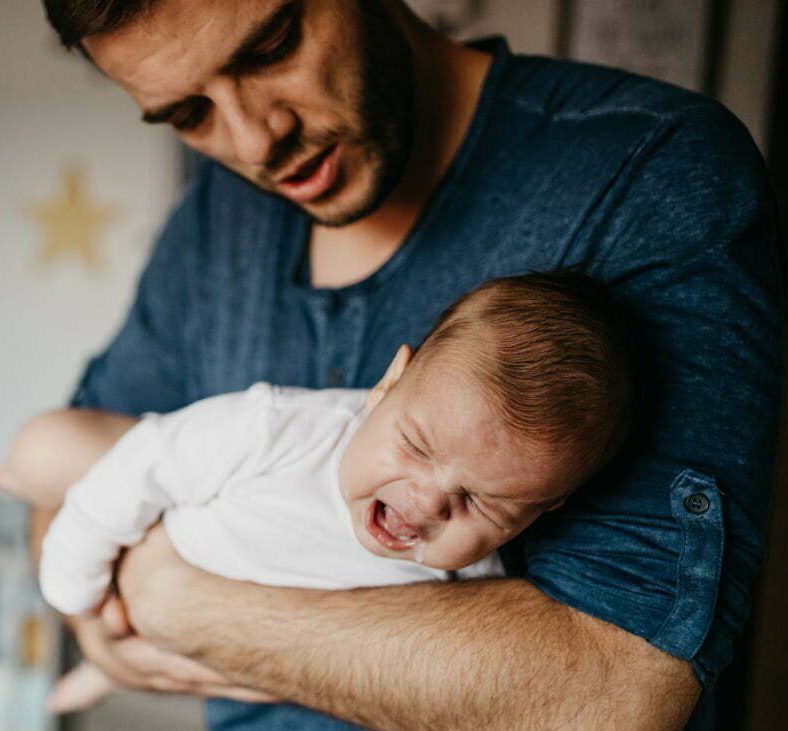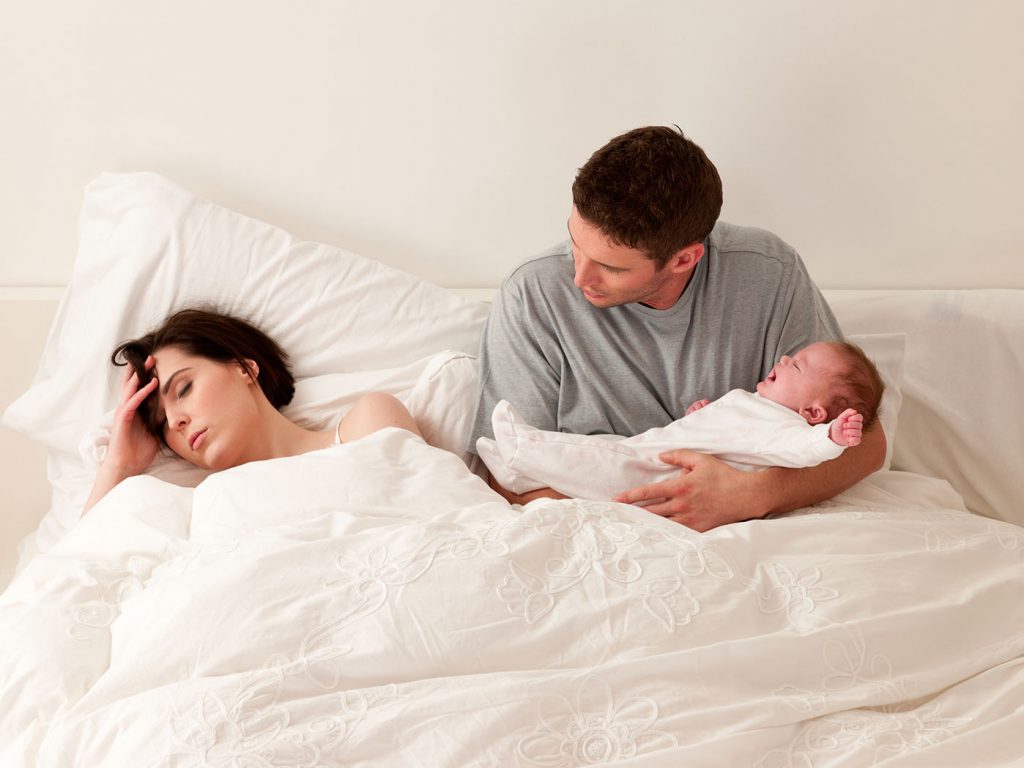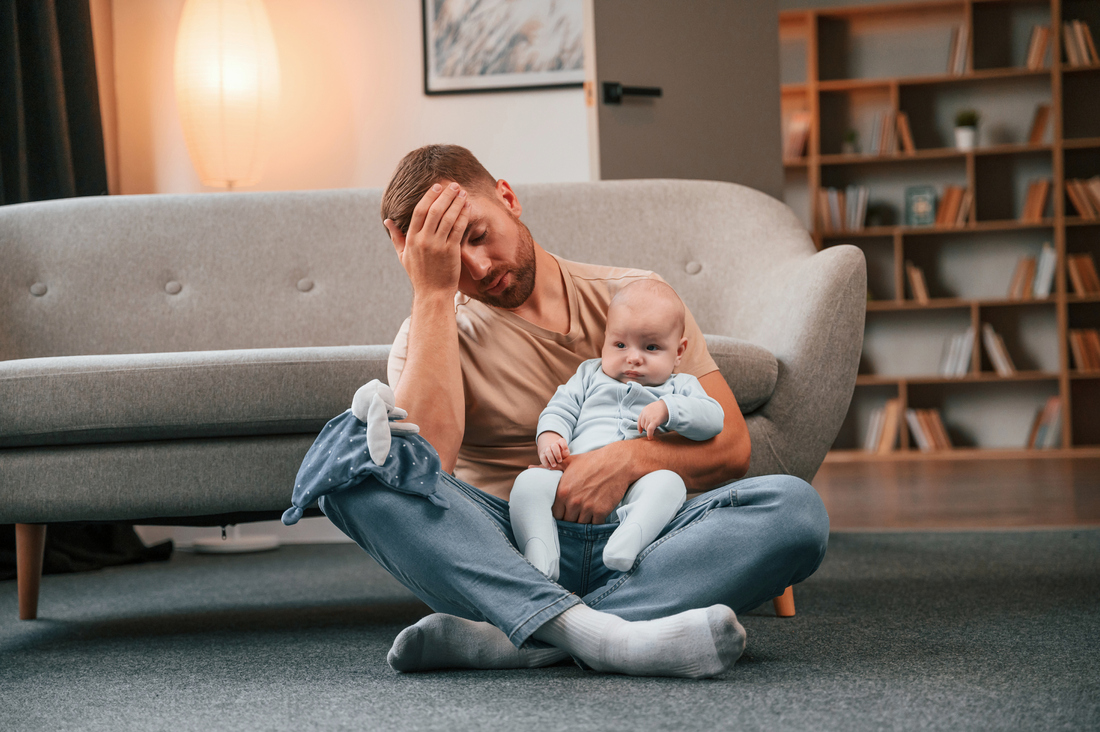When we hear the term postpartum depression, most people immediately think of new mothers — and for good reason. The physical and emotional toll of childbirth on women is immense. But what’s often overlooked is that fathers, too, can experience deep emotional struggles after the birth of a child. Yes, men can experience postpartum depression.
While it may not be as widely recognized or openly discussed, research shows that up to 1 in 10 new dads face symptoms of depression in the first year after their child is born. Yet because of cultural expectations, stigma, and a lack of awareness, many men suffer in silence — unsure of what they’re feeling, or whether it’s even valid.
Recommended: Best Freezer Meal For Postpartum
This blog dives into the reality of postpartum depression in men — what it is, why it happens, how it looks different from what we see in women, and what steps can be taken toward healing. Because supporting new fathers is just as important as supporting new mothers.
Why Postpartum Depression Is Often Seen as a “Women-Only” Issue
Postpartum depression has long been framed as a condition exclusive to women — particularly new mothers — and there are several reasons why this misunderstanding persists:

1. Biological Focus on Women
Much of the conversation around postpartum depression centers on the hormonal changes women experience after childbirth. The sharp drop in estrogen and progesterone, along with the physical demands of pregnancy and delivery, make postpartum depression in women more biologically visible. This has led many to believe that only women can suffer from it.
2. Cultural and Gender Stereotypes
Society often views men as the “strong” and “emotionally stable” gender, especially during major life events like becoming a parent. There’s a deeply rooted belief that men should be the supporter, not the one needing support. As a result, emotional struggles in men — especially after childbirth — are often minimized or dismissed entirely.
Recommended: Best Protein Powder for Postpartum Weight Loss
3. Lack of Awareness and Screening for Fathers
While new mothers are often screened for postpartum depression during postnatal checkups, fathers are rarely asked about their mental well-being. The absence of regular screening and awareness campaigns contributes to the belief that men don’t — or shouldn’t — experience postpartum depression.
4. Underreporting by Men
Men are generally less likely to talk about their mental health or seek help for emotional issues due to fear of judgment or appearing weak. This underreporting makes male postpartum depression seem rare, when in fact, it may simply be underrecognized.
5. Media Representation
When postpartum depression is portrayed in media, it’s usually through the lens of a struggling mother. The lack of stories, headlines, or films showing fathers battling emotional health after childbirth reinforces the misconception that it’s not a “male issue.”
What Is Postpartum Depression in Men?
Postpartum depression in men — sometimes called paternal postnatal depression (PPND) — is a serious emotional and psychological condition that affects some fathers after the birth of a child. While it doesn’t get as much attention as maternal postpartum depression, it’s a real and valid experience.
Just like mothers, new fathers go through major life changes when a baby arrives: disrupted sleep, financial pressure, new responsibilities, and changes in their relationship. These stressors, combined with emotional overwhelm, can lead to depression — even if they didn’t carry the child.
Recommended: How Often Should Men Get Hormone Levels Checked?
Unlike the more commonly recognized “baby blues” in women (which usually fade within a couple of weeks), postpartum depression in men tends to develop more slowly and may not show up until weeks or months after the baby is born. Some men may not even recognize that what they’re experiencing is depression — they might just feel off, irritable, disconnected, or numb.
It’s important to note that while men don’t go through the hormonal rollercoaster of childbirth, they can still experience hormonal changes. Studies suggest that new dads can see a drop in testosterone, and shifts in cortisol and other stress-related hormones — all of which can affect mood and behavior.
Ultimately, postpartum depression in men is not about weakness or failure. It’s a mental health condition that deserves attention, compassion, and treatment — just like it does for mothers.
Signs and Symptoms of Postpartum Depression in Men
Postpartum depression doesn’t always look the same in men as it does in women — and that’s part of what makes it harder to spot. While some men may show classic signs of depression, others express it in ways that are often misunderstood or overlooked.
Here are some common signs and symptoms of postpartum depression in men:
Emotional Symptoms
- Constant irritability or anger
- Feeling overwhelmed, hopeless, or worthless
- Increased anxiety or panic attacks
- Emotional numbness or detachment
- Sadness or frequent mood swings

Physical Symptoms
- Constant fatigue or low energy
- Changes in appetite (eating too much or too little)
- Trouble sleeping, even when the baby is asleep
- Unexplained aches and pains
Recommended: Is Lack of Sleep Affecting My Testosterone Levels?
Behavioral Symptoms
- Withdrawing from family, friends, or activities they used to enjoy
- Escaping into work, hobbies, or screens to avoid home life
- Drinking more alcohol or using drugs to cope
- Becoming more argumentative or easily frustrated
- Difficulty bonding with the baby
Relationship Strain
- Feeling distant from or resentful toward their partner
- Difficulty communicating or increased conflicts at home
- Feeling like a failure as a father or partner
Causes and Risk Factors of Postpartum Depression in Men
Postpartum depression in men doesn’t happen out of nowhere. It’s usually triggered by a mix of emotional, environmental, and sometimes even biological factors. While every new dad experiences stress, certain conditions can make some men more vulnerable to developing depression after the birth of a child.
Here are some of the most common causes and risk factors:
1. Hormonal Changes
Men experience hormonal shifts too. After becoming fathers, some men have been found to have:
- Lower testosterone levels
- Higher cortisol (stress hormone)
- Changes in estrogen and prolactin
These hormonal fluctuations can influence mood, energy levels, and emotional regulation.
2. Personal or Family History of Mental Health Issues
Men who have previously struggled with depression, anxiety, or other mental health conditions — or have a family history of them — are at higher risk for developing postpartum depression.
Recommended: How to Rebuild Confidence After Sexual Failure
3. Financial or Work-Related Stress
Raising a child brings new financial responsibilities. If the father feels pressure to provide or worries about job security, it can increase feelings of stress, fear, and inadequacy
4. Relationship Problems

Tension between partners — whether due to lack of communication, intimacy issues, or shifting roles — can deeply affect a father’s emotional state. Feeling emotionally distant from a partner can worsen depressive symptoms.
5. Feeling Unprepared for Fatherhood
Many men feel unready or overwhelmed by the responsibilities of being a parent — especially first-time dads. This can lead to self-doubt, guilt, or the feeling that they’re not doing enough.
6. Lack of Sleep
Sleep deprivation is a major contributor to mental health issues. New fathers often lose sleep due to baby care, which can cause exhaustion, irritability, and mood swings.
7. Lack of Support
Men who don’t have a strong support system — emotionally, socially, or practically — may feel isolated. Without someone to talk to or lean on, emotions can spiral into depression.
8. Unplanned or Complicated Pregnancy
If the pregnancy was unexpected, or if there were complications during birth, the emotional toll can lead to anxiety, guilt, or trauma — all of which are potential risk factors for depression.
Effects of Postpartum Depression in Men on the Family
Postpartum depression doesn’t just affect the person experiencing it — it sends emotional ripples through the entire family. When a new father is struggling with depression, it can impact everything from daily routines to emotional connections, creating strain in ways that are often hard to talk about.
Recommended: How to Fix Delayed Ejaculation from Antidepressants
Here are some of the key ways male postpartum depression can affect the family:
1. Strained Relationship with Partner
- Depression often causes emotional withdrawal, irritability, or communication breakdown.
- The partner may feel unsupported, confused, or even blamed — especially if they’re also adjusting to new parenthood.
- This can lead to increased arguments, feelings of resentment, and a sense of emotional distance.
2. Weakened Bond with the Baby
- Fathers with postpartum depression may struggle to connect emotionally with their newborn.
- They might avoid caregiving tasks or feel overwhelmed by the baby’s needs.
- This can delay father-child bonding and affect the baby’s emotional development in the long term.
3. Impact on Child Development
- Research shows that when a parent is depressed, especially during a child’s early months, it can influence the child’s cognitive, emotional, and behavioral development.
- Children may become more anxious, withdrawn, or even mimic negative emotional patterns as they grow.
4. Emotional Environment at Home
- Depression can change the tone of the entire household.
- Instead of a nurturing, joyful space, the home may feel tense, quiet, or emotionally cold.
- Both partners may begin to feel alone, unsupported, or overwhelmed.
5. Ripple Effect on the Mother’s Mental Health
- If a new mother is also dealing with postpartum depression or stress, having a depressed partner can worsen her symptoms.
- It becomes a cycle where both parents are emotionally drained, making it harder for either to recover or feel supported.
Recommended: How to Manage Performance Anxiety for Improved Male Intimacy
Postpartum depression in fathers is not a personal failure — it’s a mental health issue that deserves attention and compassion. Recognizing its effects on the family is the first step toward healing together, not alone.
How Partners and Families Can Offer Support
When a father is going through postpartum depression, the love and support of those closest to him can make a world of difference. Often, men may not feel comfortable opening up about their struggles, so it’s important for partners and family members to be observant, patient, and proactive in offering help.
Here are some ways to offer meaningful support:
1. Start the Conversation Gently
- Ask open-ended questions like, “How have you been feeling lately?” or “Is there anything you’re struggling with that you haven’t told me?”
- Avoid judging or pushing — let him know it’s okay to talk, and you’re listening.
2. Listen Without Trying to “Fix”
- Many men fear being seen as weak if they admit they’re hurting.
- Sometimes, just having someone who listens without offering solutions or criticism is enough to open the door to healing.
3. Show Empathy, Not Blame
- Don’t assume he’s being distant, lazy, or cold on purpose. Remember, depression isn’t always visible.
- Use “I” statements like, “I’ve noticed you seem down lately, and I want to support you however I can.”
Recommended: How to Make Sperm Stronger for Pregnancy
4. Share Parenting Responsibilities
- Offering to take over some baby-related tasks can relieve pressure.
- Encouraging shared bonding time with the baby — without pressure — may also help him reconnect.

5. Encourage Professional Help
- Suggest seeing a therapist or doctor, especially if symptoms persist or worsen.
- Offer to go with him to the first appointment or help find resources — sometimes just taking that first step is the hardest part.
6. Create a Supportive Environment
- Keep communication open and honest without overwhelming him.
- Reduce stress where possible — help with chores, meals, or even giving him alone time if needed.
7. Include the Larger Family
- Other family members can help by checking in, offering babysitting, or simply being a calm presence in his life.
- Just knowing he’s not alone can lift a huge weight.
Conclusion
Postpartum depression isn’t just a “woman’s issue” — it’s a human issue. While motherhood comes with its own unique emotional challenges, fatherhood does too. Men can, and do, experience postpartum depression. The difference is, many don’t realize it or feel safe enough to talk about it.
By raising awareness, challenging stereotypes, and creating a space where fathers feel seen and supported, we can help break the silence around paternal mental health. No parent should feel alone during one of the most life-changing moments of their life.
